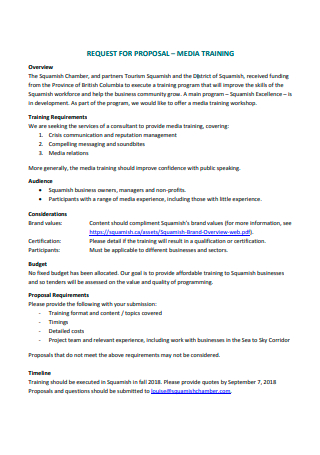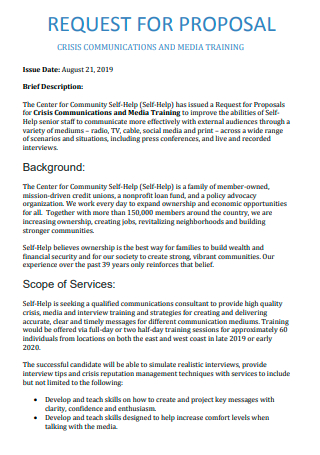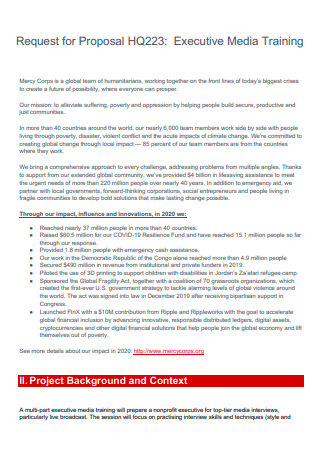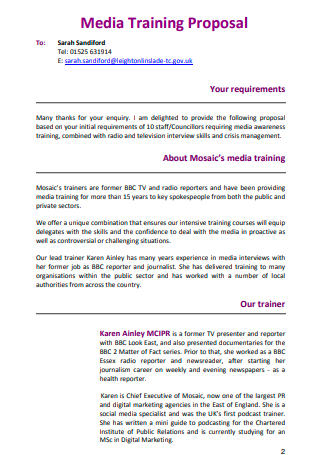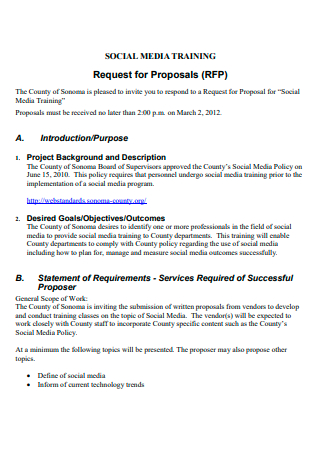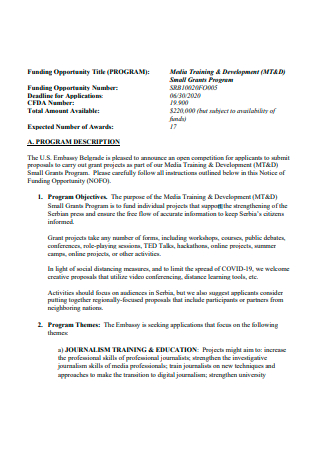5+ Sample Media Training Proposal
FREE Media Training Proposal s to Download
5+ Sample Media Training Proposal
What Is a Media Training Proposal?
Why Is Media Training Important?
Various Comfort-Levels
Various Media Training Program Content
How to Make a Media Training Proposal
FAQs
What is the goal of media training?
How much does media training cost?
How long does media training usually take?
What Is a Media Training Proposal?
Media training is a type of communications training that teaches those who work with the media to anticipate reporter behavior, avoid typical pitfalls, and confidently focus on their message. During a training session, you may expect specialized teachings on how to engage with a certain media platform, as well as practice scenarios that simulate real-life situations. Working with real cameras, mock interviews, and mock press conferences are just a few examples. This is where a proposal comes into the picture, as it organizes all the information in one concise document. Continue reading below and follow the guide this article has prepared for you.
Why Is Media Training Important?
Media training is essential for anyone who works with media relations, regardless of the position they occupy in their respective companies or organizations. It aids in the clarification of essential messages and equips you with the skills necessary to properly engage in an interview and leverage media coverage to your advantage. It’s not enough to be a specialist in your field, because there are a variety of scenarios that can arise during an interview. These can throw you off or divert your attention away from your main points. Media training can assist you to grasp what the media is searching for and what to expect from them.
Various Comfort-Levels
Individuals in your company are likely to have varying levels of comfort with social media technologies. Customize training options to meet their specific need. This is the most effective way to ensure that your team receives the training it requires, that everyone learns something, and that no one gets stuck in a boring or ineffective training course. The purpose of being aware of your government officers or employees’ comfort levels is so that you can work around their knowledge or lack of it in developing their sense of usage of media which will improve the course or content of your Proposal Letter.
Various Media Training Program Content
Before proceeding to write the proposal, you must be aware of the different content your media training program can focus on. Social media may have a significant impact on your company’s success, and establishing a media training program can help you maximize the benefits it offers. Social media technologies can only help you achieve your objectives if your staff understands how to utilize them effectively, not simply competently. Get your entire staff active in social media and deliver effective training program content to guarantee they know what they are doing.
How to Make a Media Training Proposal
Assuming you have gathered the sufficient information that the company has wanted, it is your time to present what you have written for the proposal for the media training. The training program will provide learners with tools and tactics to prepare for a variety of media-related involvement. Employee training increases knowledge of your company’s rules and messages as well as the resources available to them. Interview simulations can address sensitive and confidential concerns because training activities are covered by a non-disclosure agreement. In most companies, the communications department is in charge of overseeing a wide range of communications activities.
1. Prepare an Executive Summary
As the first section of the proposal, the information you will be including in this part will be of utmost importance. An Executive Summary is typically one to four pages long, with an average length of one to four pages. It should be written in short paragraphs and in language that is clear and simple for the intended reader. You have to understand the reader’s intended output to convey the message as clearly as possible. The summary must also follow the same structure and flow as the main document.
2. Define the Flow of the Media Training
For the next step, you will need to present in your proposal what you intend to include in the media training program. You can refer to the curated list above on the different possible courses your content can focus on. Additionally, refer to the various comfort levels as well in order to assess the digital awareness and knowledge the participants have. You can’t fill your media training with jargon that digital newbies are unaware of.
3. Finalizing a Media Trainer
If you are also acting as the media Trainer, then you can skip this step. If not, then you will need to be aware that choosing the right trainer is critical. Referrals from your corporate communications department and other human resources specialists should be able to provide references and explain their course contents, training approach, and pricing policies in detail. They should also be prepared to accommodate particular demands and deal with any peculiarities specific to the company or the participants. You should meet the individual who will be delivering the training to check that they are diplomatic, credible, and capable of forming a rapport with the training participants.
4. Clarifying your Scope of Services
If you work for a company that is desiring a media training proposal, then you can skip this step and proceed to the next one. Alternatively, if you don’t work for them, then you will need to explain the services you offer. It is important for you to lay the terms of your Scope of Work so that companies will not be asking too much from you. In a sense, you are not doing anything beyond your expectations and abilities.
5. Finishing Up the Proposal
Prepare Proposal templates along with questionnaires to track participants’ satisfaction with the program, material, and trainer once the training session is over. Debriefing sessions can also be held to identify which aspects of the program were successful and which need to be improved. Use this data to organize future sessions or hold follow-up and refresher sessions. Don’t forget to provide the trainer with your thoughts and opinions. Good trainers are always searching for ways to enhance their services, and your feedback is an important part of that.
FAQs
What is the goal of media training?
Since media training is a type of communication training that focuses on engaging with the media, its main purpose is to help the company’s employees or certain teams to understand and prepare for their task or job as a spokesperson for your company. You will learn how to anticipate inquiries from curious journalists, avoid typical pitfalls and pressuring situations, and stay focused on your main points as you converse through them.
How much does media training cost?
The cost of media training services varies depending on the company, the number of clients or participants, and the sessions or courses covered throughout the training program. Fees might range from $1,500 to $20,000 or more, depending on the number of individuals being trained, the amount of time involved, and the difficulty of the material.
How long does media training usually take?
The length of a media training workshop varies depending on the company’s demands and the courses addressed throughout the sessions. Some programs run two to three hours, while others require a full workday to complete. On rare occasions, sessions that involve confidential topics may require having numerous training programmes, just to ensure that the employees are more than prepared to face the media press regarding inquiries about what the company is up to. Proceed to view the proposal example now and assess how long your program could take.
You may just jump right into the action and begin doing what you want when you are utilizing social media for your own personal usage. Using social media for business, on the other hand, necessitates a smart and informed strategy. Developing an efficient corporate social media training program is a great approach to empower your staff as social media ambassadors and guarantee that everyone on your team is working toward the same objective as well as making sure that you all are on the same page when it comes to information that you can share to the public.

